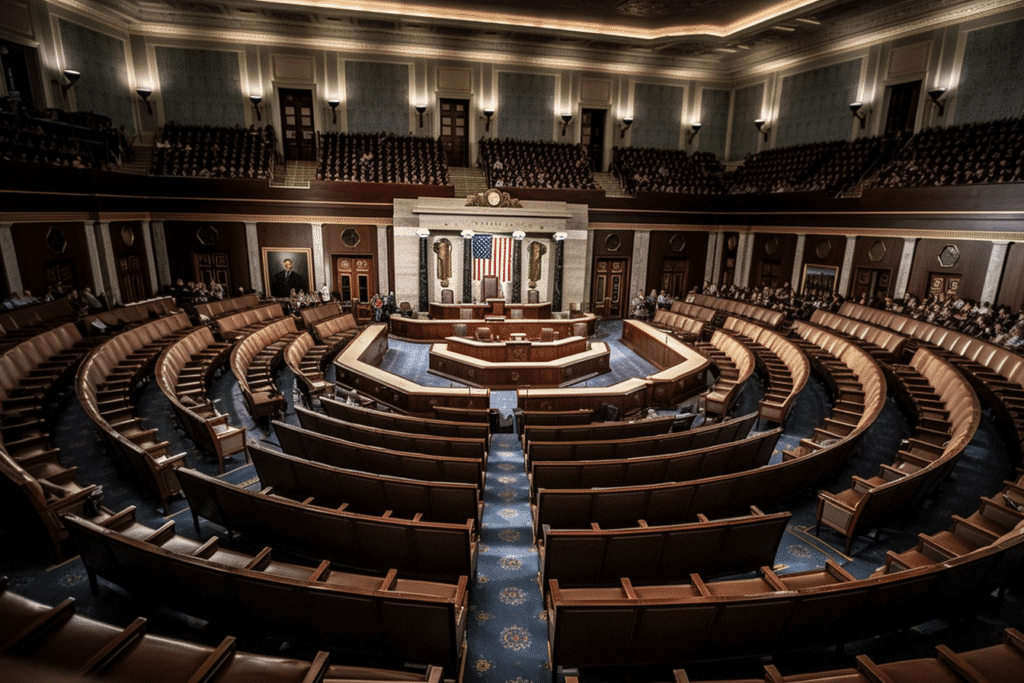The FOMC, the FOMOC… the FMOC… the FOMQUE? Don’t try to pronounce it that way, just say the F.O.M.C. or the Federal Open Market Committee.
This is the committee responsible for making decisions on short-term monetary policy in the United States (interest rates and asset purchases or sales).
In other words, a committee that has a significant influence on the future of the economy in the USA, but also for all the others that gravitate around it, in other words, the world economy.
It is composed of the members of the Board of Governors of the U.S. Federal Reserve (Central Bank of the United States, also known as the Fed) and five presidents of the regional Federal Reserve Banks.
They meet 8 times a year to analyze the state of the U.S. economy (January, March, April, June, July, September, November and December).
The FOMC considers the risks and opportunities, and determines the appropriate monetary policy to achieve the institutions’ employment and inflation objectives.
So what are the impacts of the FOMC decisions on the global economy and on crypto, and what’s the news? This is what we will see here.

PART 1 – The different operations conducted by the FOMC
As mentioned above, the FOMC makes important decisions about the economy.
For example, setting interest rates. Indeed, the FOMC can decide to raise, lower or hold rates to stimulate or slow the economy depending on its assessment of the economic situation.
The FOMC may also decide to buy or sell U.S. Treasury securities or other assets to influence interest rates and the supply of liquidity in the market.
With respect to monetary policy communication, the committee issues regular press releases to inform the public of its decisions, as well as its economic and financial outlook.
There is the determination of inflation and employment goals as well, where the FOMC takes actions to achieve these goals, such as interest rate adjustments.
Ultimately, the primary goal is to ensure the financial and economic stability of the United States, in order to move towards sustainable growth.

PART 2 – How do FOMC decisions affect your wallet?
Decisions made by the FOMC can have a significant impact on the economy of the rest of the world.
In particular, with regard to exchange rates. Since the FOMC makes interest rate decisions, this can directly influence the exchange rates between the U.S. dollar and other currencies.
Imagine the impact this can have on exports, imports and investments in foreign countries.
The same is true for capital flows between the United States and other countries. For example, if the FOMC decides to keep interest rates low, it may encourage investors to seek higher yields in other countries, which may lead to an appreciation of foreign currencies and an influx of capital into those countries.
In terms of financial stability, countries that are closely tied to the United States financially are even more concerned.
As we know, countries with an expansionary monetary policy encourage their investors to take risks. If one of these countries goes through a bad patch, it can lead to repeated financial turbulence.
And what is more, the US has a key role in the global financial system.
Countries and companies around the world should therefore keep a close eye on the FOMC’s decisions and their potential impact on their economies.

PART 3 – Should the FOMC’s opinion be taken into account?
Overall, it is better to go along with the decisions made by the FOMC.
However, there are exceptions:
- Like the U.S. Congress, which can legislate to influence the monetary policy of the FED, which is directed by the FOMC. For example, it can pass laws to change the Federal Reserve’s mandate or to limit its monetary policy powers.
- Central banks in other countries may also adopt countercyclical monetary policies. For example, raising interest rates to control inflation, to try to bring about an appreciation of the country’s currency and an influx of foreign capital.
- Financial markets and investors may interpret the FOMC’s decisions differently, depending on their own interests or perceptions of the economy and financial markets.

PART 4 – The impact of the FOMC on the crypto market
Since the FOMC can determine whether or not to raiseinterest rates, this necessarily results in influencing the movement of capital and liquidity flows to and from the crypto market.
For example, low interest rates may encourage investors to seek higher returns in risky assets like crypto-currencies.
As we mentioned earlier, in a risk-taking policy, investors tend to want to commit themselves in a brutal way to this or that market. And the crypto one is no exception to the rule, creating then risks of market volatility.
Another element is that the FOMC’s decisions may also have an impact on institutional investors’ interest in the crypto market.
Monetary policies that encourage increased inflation may cause institutional investors to turn to assets like Bitcoin, which are considered alternative stores of value.

Record of President Powell’s* speech at the press conference dated May 3, 2023:
- Conditions in the banking sector have improved since early March, but the Fed remains vigilant and is working to strengthen bank supervision and regulation.
- Monetary policy is focused on the Fed’s two goals: promoting maximum employment and stable prices for the American people.
- Inflation remains high, but the Fed is determined to bring it back to its 2% target.
- Since the beginning of 2022, interest rates have increased by 5% in order to bring inflation back to its target. At this last meeting, the FOMC raised the interest rate by 0.25%.
- Economic growth remains moderate, while the labor market remains tight. The housing market is weak and business investment is slowing.
- The next meeting will be held on June 13 and 14.
*Jerome Hayden Powell is an American lawyer and banker. Most importantly, he has been the chairman of the Board of Governors of the U.S. Federal Reserve (FED) since 2018




0 comments